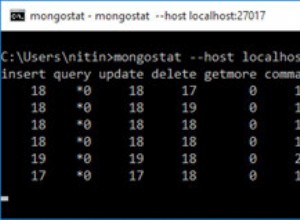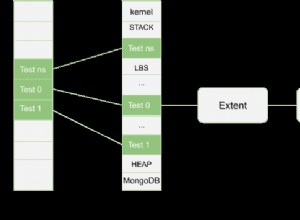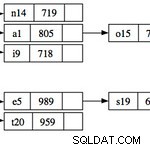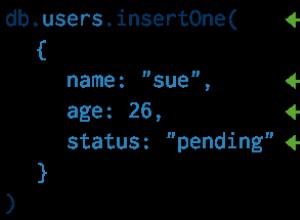Haftungsausschluss:Ich empfehle nicht, dies auf der Serverseite (also innerhalb von MongoDB) zu tun, sondern diesen Fall auf der Clientseite zu behandeln.
Das heißt, hier ist eine generische Lösung für Ihr Problem, die sich leicht an Ihren speziellen Fall anpassen lässt.
Stellen Sie sich vor, Sie haben die folgenden Dokumente (oder die Ausgabe einer Aggregationspipeline wie in Ihrem Beispiel):
{
"category" : 1
}
{
"category" : 1
}
// note the missing { category: 2 } document here
{
"category" : 3
}
Die folgende Pipeline erstellt leere Buckets (also Dokumente mit einer Anzahl von 0 für die „Lücken“-Werte, die im Wertebereich in der category fehlen Feld - in diesem Fall die Zahl 2):
var bucketSize = 1;
db.getCollection('test').aggregate({
$group: {
_id: null, // throw all documents into the same bucket
"min": { $min: "$category" }, // just to calculate the lowest
"max": { $max: "$category" }, // and the highest "category" value
"docs": { $push: "$$ROOT" } // and also keep the root documents
}
}, {
$addFields: {
"docs": { // modify the existing docs array - created in the previous stage
$concatArrays: [ // by concatenating
"$docs", // the existing docs array
{
$map: { // with some other array that will be generated
input: {
$range: [ "$min", "$max", bucketSize ] // based on the min and max values and the bucket size
},
as: "this",
in: { // but represented not as a plain number but as a document that effectively creates a bogus document
"category": "$$this", // the bogus category will be set to the respective value
"bogus": 1 // marker that allows us not to count this document in the next stage and still get a bucket from $group
}
}
}
]
}
}
}, {
$unwind: "$docs" // flatten the "docs" array which will now contain the bogus documents, too
}, {
$group: {
_id: "$docs.category", // group by category
"count": { // this is the result we are interested in
$sum: { // which will be aggregated by calculating the sum for each document of
$cond: [ // either 0 or 1 per document
{ $eq: [ "$docs.bogus", 1 ] }, // depending on whether the document should count as a result or not
0,
1
]
}
}
}
})
Die Ausgabe der obigen Abfrage lautet:
{
"_id" : 2,
"count" : 0.0 // this is what we wanted to achieve
}
{
"_id" : 3,
"count" : 1.0 // correct number of matches
}
{
"_id" : 1,
"count" : 2.0 // correct number of matches
}




